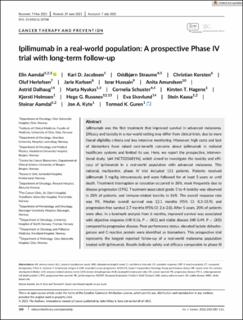Ipilimumab in a real-world population: A prospective Phase IV trial with long-term follow-up
Aamdal, Elin; Jacobsen, Kari Dolven; Straume, Oddbjørn; Kersten, Christian; Herlofsen, Oluf; Karlsen, Jarle; Hussain, Israr; Amundsen, Anita; Dalhaug, Astrid; Nyakas, Marta Sølvi; Schuster, Cornelia; Hagene, Kirsten Thorin; Holmsen, Kjersti; Russnes, Hege Elisabeth Giercksky; Skovlund, Eva; Kaasa, Stein; Aamdal, Steinar; Kyte, Jon A.; Guren, Tormod Kyrre
Peer reviewed, Journal article
Published version

Åpne
Permanent lenke
https://hdl.handle.net/11250/2987559Utgivelsesdato
2021Metadata
Vis full innførselSamlinger
- Institutt for samfunnsmedisin og sykepleie [3640]
- Publikasjoner fra CRIStin - NTNU [38055]
- St. Olavs hospital [2505]
Sammendrag
Ipilimumab was the first treatment that improved survival in advanced melanoma. Efficacy and toxicity in a real-world setting may differ from clinical trials, due to more liberal eligibility criteria and less intensive monitoring. Moreover, high costs and lack of biomarkers have raised cost-benefit concerns about ipilimumab in national healthcare systems and limited its use. Here, we report the prospective, interventional study, Ipi4 (NCT02068196), which aimed to investigate the toxicity and efficacy of ipilimumab in a real-world population with advanced melanoma. This national, multicentre, phase IV trial included 151 patients. Patients received ipilimumab 3 mg/kg intravenously and were followed for at least 5 years or until death. Treatment interruption or cessation occurred in 38%, most frequently due to disease progression (19%). Treatment-associated grade 3 to 4 toxicity was observed in 28% of patients, and immune-related toxicity in 56%. The overall response rate was 9%. Median overall survival was 12.1 months (95% CI: 8.3-15.9); and progression-free survival 2.7 months (95% CI: 2.6-2.8). After 5 years, 20% of patients were alive. In a landmark analysis from 6 months, improved survival was associated with objective response (HR 0.16, P = .001) and stable disease (HR 0.49, P = .005) compared to progressive disease. Poor performance status, elevated lactate dehydrogenase and C-reactive protein were identified as biomarkers. This prospective trial represents the longest reported follow-up of a real-world melanoma population treated with ipilimumab. Results indicate safety and efficacy comparable to phase III
